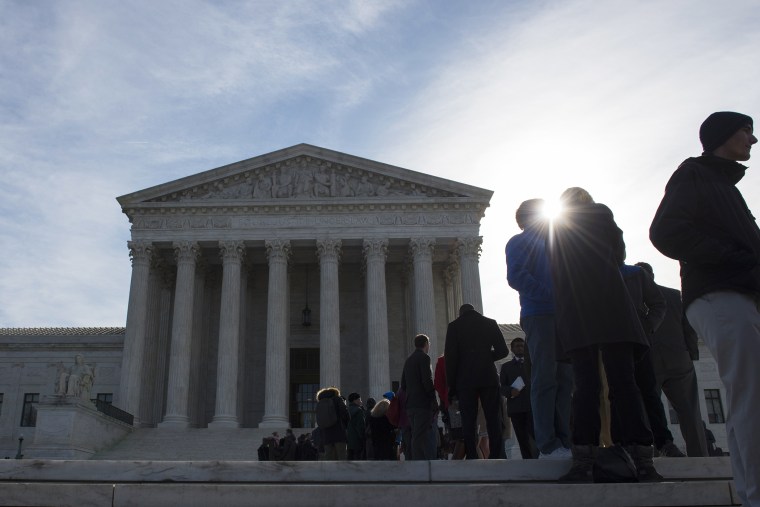Experienced court watchers tend to agree: predicting the outcome of Supreme Court cases based solely on oral arguments is problematic. Justices often play devil's advocate; they think out loud from the bench; and they challenge attorneys on points they already find persuasive, just to see how they'll respond.
That said, many who heard this morning's arguments in
Obergefell v. Hodges came away with the impression that the high court's conservatives were skeptical of marriage equality. NBC News' Pete Williams
reported:
The conservatives were joined by Justice Anthony Kennedy, considered a swing vote, who asked whether the public and scholars need more time to debate changes to a practice that has been understood as between a man and a woman for centuries. "It's very difficult for the court to say, 'We know better,'" Kennedy told Mary Bonauto, a lawyer representing same-sex couples, according to The Associated Press.
This is no small detail. Kennedy, considered
the key swing justice in this case, reportedly emphasized historical norms, suggesting that proponents of marriage equality want to change an institution that has lasted for a "millennia."
Chief Justice John Roberts, whom progressives also hoped to persuade, stressed a similar point,
reportedly telling supporters of equal-marriage rights, "If you succeed, [the traditional definition of marriage] will not be operable. You are not seeking to join the institution. You are seeking to change the institution." He added, "[I]f you prevail here, there will be no more debate. The debate will close minds, and it will have consequence on how this new institution is accepted."
According to the New York Times' report, Justice Samuel Alito wondered aloud whether marriage between same-sex couples would lead to groups of four people getting married, while Justice Antonin Scalia said some clergy might be forced to perform wedding ceremonies against their will.
Not to put too fine a point on this, but these are lazy, ridiculous arguments. Supreme Court standards have fallen, but this is cheap nonsense, even from far-right justices. It should be obvious, for example, that marriage equality is fundamentally different from polygamy. It should be equally obvious that there's literally nothing to suggest clergy would be forced to do anything, ever -- and over a decade after same-sex marriages began in the United States, there are still zero examples of religious leaders being compelled to officiate any union.
The court's center-left justices, meanwhile, seemed
far less skeptical of the position already embraced by the American mainstream and most of the appellate courts.
Later, when the lawyer for the opponents of gay marriage began arguing, Justice Stephen G. Breyer forcefully questioned why states should be able to exclude gay people from marriage. "Marriage is open to vast numbers of people," he said, adding that same-sex couples "have no possibility to participate in that fundamental liberty. And so we ask why." Several of the more liberal justices also pressed the opponents of gay marriage to say how, exactly, extending marriage to same-sex couples could harm heterosexual couples who want to marry. Justice Ginsburg was particularly blunt on that point. "You are not taking away anything from heterosexual couples" if the state allows gay couples to marry," she said.
It seems likely that marriage equality has four votes. Whether that fifth vote will materialize remains an open question.
Second Update: Not surprisingly, different observers have different reactions to what they heard. Chris Geidner, who covers the issue closely,
believes the justices "appears ready to rule In favor of marriage equality." The AP
report added that Kennedy "asked skeptical questions of both sides" today.
